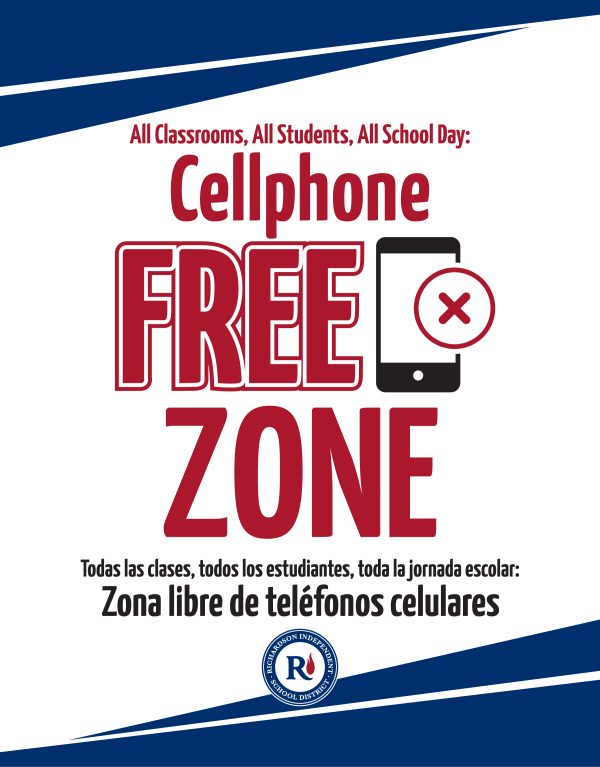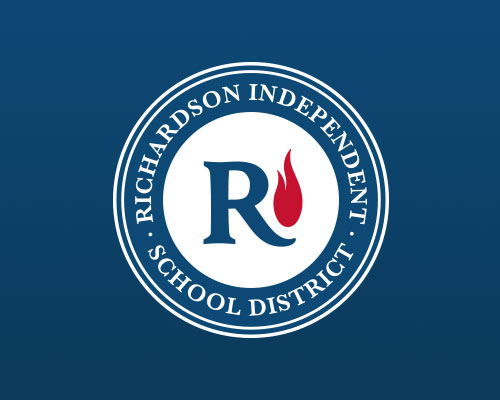UPDATED Nov. 4 – Board Presentation of Survey Results
Trustees also received results of the surveys sent to students, parents and teachers regarding the district’s focus on enforcing the policy of no student cellphone use in classrooms or hallways.
Data indicates that teachers are recapturing instructional time in the classroom due to the execution of the policy.
Parent responses indicate they believe students are less distracted during the day and can focus on classwork. Both parents and teachers favor continuation of the current policy and enforcement tools before considering changes or expansion.
Click here for the presentation of the survey results.
UPDATED Aug. 12 – RISD Secondary Schools Are Cellphone-Free
At the Aug. 11 Board meeting, RISD high school and junior high principals discussed the negative impact that student cellphone use at school has on classrooms, teachers, student engagement and student discipline. RISD Trustees voted unanimously to update the student electronic device policy for the first time since 2012, and RISD will be enforcing a cellphone-free environment for students in classrooms and hallways at all high schools and junior highs when school begins on August 16.
One school, Forest Meadow Junior High, will be piloting the use of Yondr pouches as a tool to facilitate the policy. RISD will track cellphone-related student discipline data and survey classroom teachers at all schools later in the first semester to evaluate the effectiveness and potential expansion of the Yondr pouch system to other schools. FMJH will communicate guidelines and expectations for the pilot to families.
Parents who choose to provide their child with a cellphone are strongly encouraged to set expectations with their child related to use at school. Here are some resources that parents can consider when setting expectations for their child’s cellphone use.
Click here to watch the Board meeting discussion about cellphones.
Click here for previous information provided to parents about RISD’s student cellphone policy.
UPDATED Aug. 10 – Superintendent Message to Secondary Parents
First, thank you to the many who took the time to provide feedback to this past weekend’s message about RISD’s cellphone proposal. Parent input is an important factor in school district decisions, and we appreciate those who have engaged on this topic.
The overwhelming takeaway from the feedback is that parents almost universally agree that cellphones are a distraction for students and a problem in the classroom. I can tell you that our principals and many secondary teachers strongly agree with this as well.
However, not every parent is sure that the Yondr pouch system is the right solution to assist with enforcement of cellphone-free campuses. Some parents cited concerns with the cost of implementing it districtwide, others cited concerns about being able to reach their student in a potential safety situation, and others questioned whether the program would be effective as some students work to circumvent the pouches.
These are valid and fair questions, and I want to share that when our principals and I meet with our school board this week, we will be modifying the cellphone discussion to address this feedback.
Our updated direction will continue to enforce cellphone-free hallways and classrooms, but we plan to scale back the Yondr system implementation to one pilot campus, Forest Meadow Junior High, instead of districtwide.
The advantage of a pilot program is that it will allow RISD to gather more data to see how effective the Yondr system is before investing in a districtwide solution. We will be able to track and compare teacher feedback and data of both phone-related classroom incidents and overall student discipline situations that involved the use of a cellphone to see how the pilot Yondr campus compares to campuses that will re-emphasize enforcing the policy in traditional ways.
It is important to remember that RISD’s current cellphone policy, in place since 2012, already prohibits student cellphone use in classrooms without permission. Yet the time required for teachers and administrators to enforce the policy, coupled with student efforts to circumvent the policy, result in an ongoing distraction and disruption for teachers, administrators, classrooms, and other students.
At the Aug. 11 board meeting, our principals and I look forward to having this conversation with our trustees, and we invite anyone in our community who is interested to attend the board meeting or watch it live online.
Regardless of the path that RISD takes, parents who choose to provide their child with a cellphone can greatly assist their child’s teachers and principals by setting clear expectations for their child about when and how it’s appropriate, and not appropriate, to use their phone related to school. At risd.org/parentcorner, we have resources and tools for parents to consider when setting expectations of their child related to cellphone use.
One thing we know is that students who hear a consistent message at home and at school are more likely to make good choices, and our professional educators who work with your students are asking for your help on this topic that has long had an impact on teaching, learning, and discipline.
Under every scenario, RISD schools will be emphasizing and enforcing cellphone-free hallways and classrooms in our secondary schools this year. We want our students to have a successful year, and need your help as parents to reinforce those expectations and help them avoid disciplinary consequences through the student code of conduct.
Thank you for your support and partnership as we seek a solution to this ongoing issue that directly impacts student learning.
Respectfully,
Tabitha Branum
ORIGINAL POST from Aug. 6
RISD is proposing an updated policy and guidelines for cellphone use among district students in grades 7-12. Click here to watch a video discussing the changes and proposed solution.
“Cellphone use among RISD secondary students during the school day has become a major issue, especially in recent years,” Superintendent Tabitha Branum said. “Phone use among students, and the ongoing classroom distractions and disciplinary issues that accompany it, are causing more and more school districts to re-evaluate student cellphone use during the school day. In RISD, our teachers, principals, and other employees who work directly with our older students have seen the ongoing distraction and lack of engagement among many students during instructional time due to phones. We’ve also experienced a wide variety of disciplinary issues that are the product of student smartphone use during the school day, including student altercations, cyberbullying, prohibited activity, photos and videos in violation of other student’s privacy rights, and social media posts or texts that result in safety concerns on campuses.”
“Our teachers, principals, and school staff have been asking for the district to take action, as classroom distraction from phone use is a daily occurrence. Student cellphone use was the number one problem RISD secondary teachers cited in our end-of-year teacher survey, and was also cited as problematic both in the RISD parent survey and in the community feedback provided during the recent superintendent search process,” said Branum.
At the Aug. 11 Board meeting, an updated policy will be proposed that prohibits cellphone use among secondary students during the school day. The updated policy is not much different than the existing policy, but approaches enforcement in a new way. After secondary principals studied ideas over the summer, RISD will be asking trustees to invest in magnet-locked cellphone bags from a company called Yondr. This company’s proprietary product – the Yondr Pouch – is used to create cell-phone free environments. These pouches have been used in schools since 2014, and here’s how the process works:
- Every RISD secondary student with a cellphone will be issued a Yondr Pouch.
- If a student has a phone, every day when entering school, students turn it off and place it in the Yondr Pouch, which prevents it from being used.
- At dismissal each day, students can unlock the Yondr Pouch at numerous unlocking stations throughout the school and begin using the phone.
This simple concept has a proven track record in more than 1,000 schools around the world. RISD principals have talked with administrators at schools that have implemented Yondr, who highly recommend the system. Among schools surveyed after implementing Yondr:
- 65% of schools saw an improvement in academic performance
- 74% of schools saw an improvement in student behavior
- 83% of schools saw an improvement in student engagement in the classroom
If approved, each RISD junior high and then high school would implement Yondr over the first weeks of the 2022-23 school year.
Parents would still be able to communicate with their student as needed during the school day. Each RISD secondary student is issued a Chromebook for use throughout each day, and every student is assigned a district email account that is readily accessible. In the event of a school emergency such as a lockdown, staff will be able to unlock Yondr bags when it is safe, allowing students to connect with parents to let them know they are OK. And students who rely on their smartphone to help manage a health condition, such as diabetes, will be able to continue to do that as part of their 504 accommodations.
Parents with feedback about the proposed cellphone updates for secondary students are encouraged to use the Let’s Talk feature on the RISD website.



